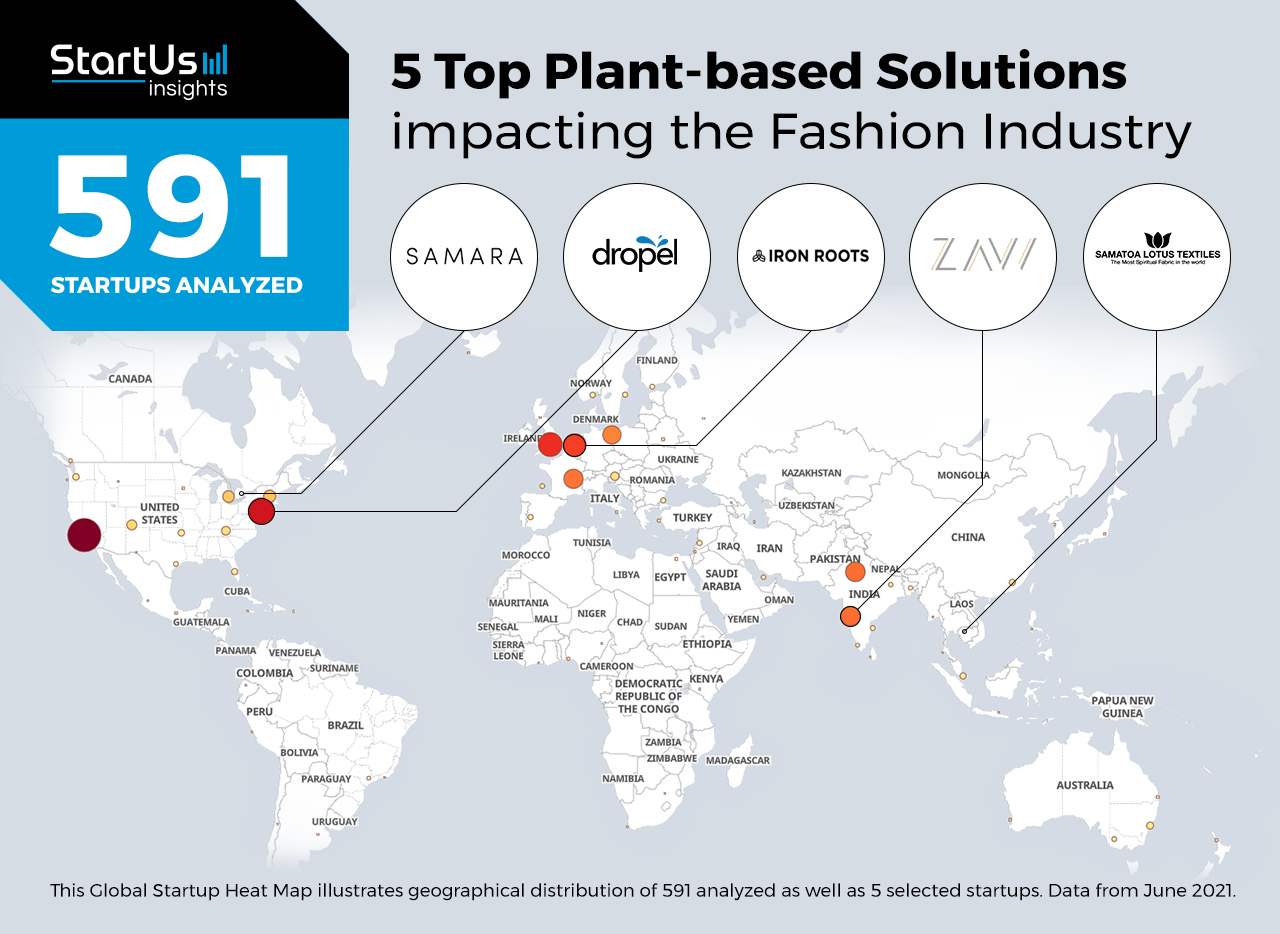Accelerate Productivity in 2025
Reignite Growth Despite the Global Slowdown
Staying ahead of the technology curve means strengthening your competitive advantage. That is why we give you data-driven innovation insights. This time, you get to discover 5 hand-picked plant-based solutions impacting fashion.
Global Startup Heat Map highlights 5 Top Plant-based Fashion Solutions out of 591
The insights of this data-driven analysis are derived from the Big Data & Artificial Intelligence-powered StartUs Insights Discovery Platform, covering 2.093.000+ startups & scaleups globally. The platform gives you an exhaustive overview of emerging technologies & relevant startups within a specific field in just a few clicks.
The Global Startup Heat Map below reveals the distribution of the 591 exemplary startups & scaleups we analyzed for this research. Further, it highlights 5 fashion startups that we hand-picked based on criteria such as founding year, location, funding raised, and more. You get to explore the solutions of these 5 startups & scaleups in this report. For insights on the other 586 plant-based fashion solutions, get in touch.
Zavi creates Ecological Fabrics
Synthetic fabrics and blends cannot biodegrade as they lack the enzymes necessary to break down the fiber. Moreover, the manufacturing of these synthetic materials is pollution-intensive and consumes a lot of water. To reduce extensive water usage and chemical dependence, startups are creating alternate solutions such as plant-based fabrics.
Indian startup Zavi produces eco-friendly fabrics while lowering the use of water consumption and synthetic chemicals. It offers lyocell, fully biodegradable hemp with antimicrobial properties, and organic cotton grown with 91% less water. Using dyes that are free from AZO chemicals and carcinogens, the startup also upcycles post-production fabric scraps into new products. Conscious of the entire lifecycle of every garment produced, the startup offers buyers an ecological choice.
SAMARA creates Plant-based Leather Solutions
Leather and faux leather fabrics are widely popular across different demographics. However, there are ethical and ecological concerns around them. Effluent from faux production leather accelerates eutrophication, harming water bodies and animals. To reduce dependence on petroleum in the fashion sector, startups are switching to greener options to create sustainable leather alternatives. Although vegan fabrics are gaining traction, there is a lack of viable vegan leather solutions. To fill this gap, startups are investigating plant-based solutions for developing leather.
Canadian startup SAMARA offers a range of natural fiber leathers. The startup’s apple leather combines apple skins that are a waste byproduct of the juicing industry and a binding agent. Leaning towards water-based polyurethane (PU) and microfiber, the startup minimizes the usage of polyvinyl chloride (PVC). The startup also provides products that use materials that comprise castor seeds, bamboo and is also developing leather made from coconut husk and pineapple.
Iron Roots designs Sportswear with Natural Fibers
Generally, sportswear is manufactured with either synthetic fabrics or, lately, recycled plastics. Clothes made out of recycled plastic release microplastics with every wash. Synthetic fabrics, including nylon and polyester, also use plastic as a component and release microplastic. To make sportswear more environmentally friendly, startups are focusing on alternative plant-based solutions that reduce plastic usage in clothes.
Dutch startup Iron Roots makes sportswear with natural fibers from hemp plants, eucalyptus, and beech trees. The startup’s solution, TENCEL, is made of eucalyptus and beechwood and provides antibacterial and antistatic properties similar to hemp. When combined with organic cotton, it creates a plastic-free alternative fabric for sportswear. Moreover, the fabric keeps the body cool, allowing athletes to train in hot environments.
Samatoa utilizes Lotus Flower Fabric and Leather
Manufacturing and processing textiles and leathers use lots of energy and involve toxic chemicals. Aiming to reach a level of zero environmental impact throughout the chain of production i.e. from extraction to final product being made, ecological textiles are being developed. Startups are exploring ways to innovate production lines as well as fabrics used to reach zero-emissions level.
Cambodian startup Samatoa makes eco-fabric from lotus flowers. With a fully integrated sustainable fabric production from fiber extracting, yarn spinning, and weaving to finished sustainable textile garment, the startup manufactures vegan leather (lotus microfiber leather) and fabrics from the lotus plant. The production process does not require oil, electricity, or gas, or any toxic chemicals and has zero environmental impact. Along with being environmentally sensitive, the startup has a social inclination to preserve the culture and thus, the traditional methods of Cambodian handicraft are followed with the new fabric.
Dropel Fabrics engineers High-Performance Natural Fabrics
Rapid adaptation of synthetic fibers due to lack of alternate options and limited innovation in the natural fibers has pushed startups to look for solutions that improve the performance of natural fibers and maintain their inherent qualities. To do this, startups are exploring possibilities using advanced material science.
US-based startup Dropel Fabrics leverages material science and textile engineering to create high-performance natural fabrics. To push sustainability in the fashion industry by reducing polyester-based microfibers pollution in our oceans, the startup maintains the qualities of natural fibers like softness and breathability and adds advanced performance to the natural fabrics. It makes PFC-free water repellent fabrics.
Discover more Fashion Startups
Sustainable startups such as the examples highlighted in this report focus on the circular economy, responsible consumption & production, and chemical recycling. While all of these technologies play a major role in advancing sustainability, they only represent the tip of the iceberg. To explore more sustainable technologies, simply get in touch to let us look into your areas of interest. For a more general overview, you can download our free Industry Innovation Reports to save your time and improve strategic decision-making.


![10 Top Blockchain Solutions for Pharma Industry [2025]](https://www.startus-insights.com/wp-content/uploads/2025/06/Pharma-Blockchain-Startups-SharedImg-StartUs-Insights-noresize-420x236.webp)





